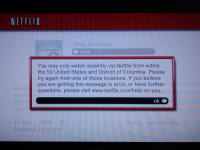The Wikileaks release of tens of thousands of Sony documents includes revelations about opposition to the copyright treaty for the blind, political fundraising, concerns about fair use in treaties, strategies to fund screening rooms in embassies to create a stronger will to protect studio interests, and personal calls to Prime Ministers (UK Prime Minister Cameron in this case) regarding the copyright law. The documents also show that Sony lobbied Netflix to stop Australian users from using VPNs to access the service. Yet it would appear that Sony’s own licence terms with Netflix opens the door to general VPN use.
The documents also include a stunning array of commercial documents, including licensing agreements with broadcasters and online video services around the world. A general search for Canadian documents immediately uncovered parts of the licensing agreement between Sony and Netflix, including the content protection requirements and obligations. Netflix is unsurprisingly requirement to encrypt all programs, use only pre-approved digital rights management systems, and meet various technical requirements. Of great interest to many Netflix subscribers, particularly those that try to access U.S. Netflix, are the requirements related to geographic filtering. The provision states:











